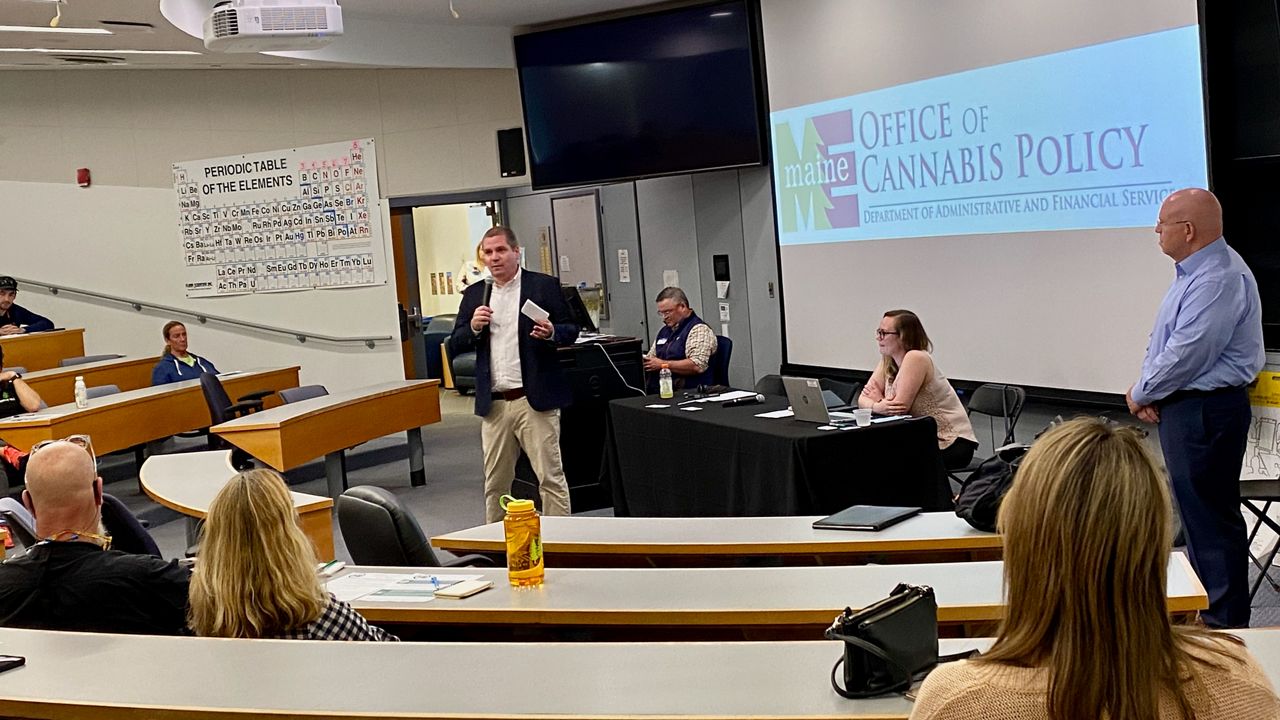State officials say they’re very concerned about a new federal racketeering lawsuit against Central Maine Power owner Avangrid, which claims executives there conspired with contractors to make overpriced and unnecessary purchases that padded profits at ratepayers’ expense.
The complaint was filed in the Southern District of New York last week by Paulo Silva, a former subcontractor for the U.S.-based Avangrid and its Spain-based owner Ibedrola.
Avangrid denies the allegations and is now accusing Silva of defamation in a countersuit filed in New Mexico, where regulators are poised to reject a major merger Avangrid is pursuing with that state’s public utility. Avangrid alleges that Silva made false claims in public comments on the deal.
In a statement, Maine Gov. Janet Mills said any proven wrongdoing that harmed Maine ratepayers “deserves swift action, accountability and consequences.”
“These allegations are alarming and deeply troubling,” Mills said. “Maine provides to its electric utilities a monopoly and, in return, they owe to Maine people reliable service at just and reasonable rates — nothing less.”
Mills called on the state Public Utilities Commission to review the complaint and “Avangrid’s history of equipment purchases in Maine,” and to ensure that CMP customers were not affected.
In a statement, PUC spokesperson Susan Faloon called the allegations against Avangrid “serious” and said regulators would be “reviewing the filings in federal court and following the proceedings closely” to decide “what additional review by the Commission may be warranted.”
The PUC has been considering an investigation of the utility after an independent audit largely blamed Avangrid for issues at CMP with billing, outages and customer service. Last week, CMP filed a state-mandated improvement plan promising to expand local oversight.
The new lawsuit against Avangrid describes a “brazen” two-year conspiracy to steal trade secrets, funnel contracts to certain vendors in exchange for quid pro quos, and make needless purchases to inflate the profits the utility could recoup from customers in states like Maine.
As CEO of Pennsylvania-based Security Limits Inc., Paulo Silva says he was on tap to design new cybersecurity technology for Avangrid in 2018. He alleges that Avangrid encouraged him to team up on bids related to the project with certain other vendors, who then openly plotted with utility executives to reuse Silva’s confidential plans in separate bids at a high-cost mark-up.
Among other claims, Silva alleges that former Avangrid security technical services manager David Lathrop would habitually leave private bid information open on his desk with one of these preferred vendors in the room, then leave, allowing them to take notes and pictures.
“When Silva brought up with Lathrop his cavalier treatment of sensitive documents, and more specifically, his failure to safeguard confidential bid information,” the suit says, “Lathrop smiled and replied, ‘I know nothing – I was in the bathroom.’ ”
The suit says Lathrop left Avangrid in 2020 to become vice president for one of these vendors, and further alleges that Silva had denied a request for a similar quid pro quo at his company.
Silva says the contractors who worked with Avangrid on the alleged scheme charged 25% to 50% more than he would have for routine equipment purchases, even buying similar equipment in successive years at vastly higher prices.
Much of this “mountain of radically overpriced hardware,” Silva alleges, was unpacked and installed in warehouses in Maine and New York but never put into service, instead sitting unused and “gathering dust” into this year as the value of the equipment depreciated.
Silva’s suit says Avangrid’s federal financial reports show a nearly billion-dollar increase in capital expenditures between 2018 and 2019. The company is allowed to recoup that kind of spending, plus a percentage-based profit margin, from ratepayers in states like Maine.
Silva argues this was Avangrid’s key motivation for the alleged bid-rigging scheme. His suit seeks damages amounting to at least $110 million on several counts of racketeering, trade-secret misconduct and breaches of contract.
Avangrid denied Silva’s allegations in a statement, claiming he’s retaliating against the company for not awarding him with lucrative contracts he sought in the past few years.
“Mr. Silva is a disgruntled subcontractor, bitter he didn’t win competitive procurements and that his relationship with the contractor soured,” the statement says, referring to one of the vendors named in Silva’s suit.
Avangrid’s countersuit focuses in part on Silva’s airing of his allegations with New Mexico regulators during public comment sessions on the proposed merger in August and again last week.
The complaint alleges that Silva falsely implied Avangrid might be hacking the computers of merger opponents, that he reiterated his racketeering claims with malicious intent, and that he claimed Iberdrola executives were indicted for corporate espionage and fraud in Spain, when in fact, Avangrid says, they are only under investigation and are still presumed innocent.
“We have concerns about Mr. Silva’s use of the New Mexico Public Regulation Commission process as a way to try to gain leverage over Avangrid to obtain future contracts that have nothing to do with New Mexico,” the countersuit says. “It is not only inappropriate but also unlawful to interfere with business activities based upon false statements.”
As it tries to finalize the New Mexico merger, Avangrid recently ran a full-page newspaper ad in the state saying the company has been a “great partner” in Maine and will be the same out west.
The ad, co-signed by supporters of CMP’s controversial Western Maine transmission line, also included Maine’s state seal. State Rep. Seth Berry argues this use of the seal is illegal and has asked Maine officials to investigate, calling it “false advertising — not protected political speech” in an email to Secretary of State Shenna Bellows and Attorney General Aaron Frey.
Berry, a frequent CMP critic who represents Bowdoinham, is also spearheading a ballot initiative campaign that would seek to create a consumer-owned utility in place of CMP in Maine.
Maine Affordable Energy, a group that state records show is funded entirely by Avangrid, is already running digital ads against the proposal. It comes on the heels of the costly and divisive referendum debate over CMP’s transmission line, now on pause pending court decisions.
A pre-trial conference in Silva’s racketeering complaint is scheduled for Feb. 17, 2022.









